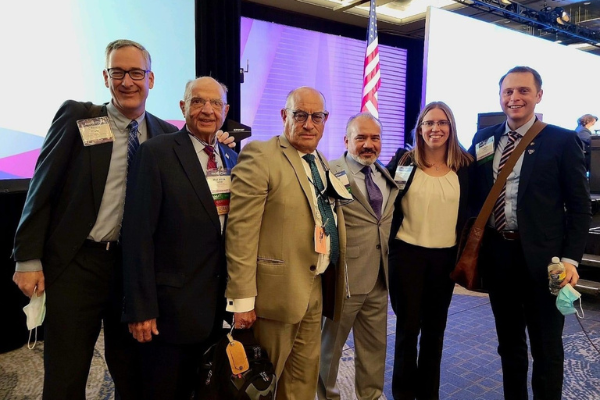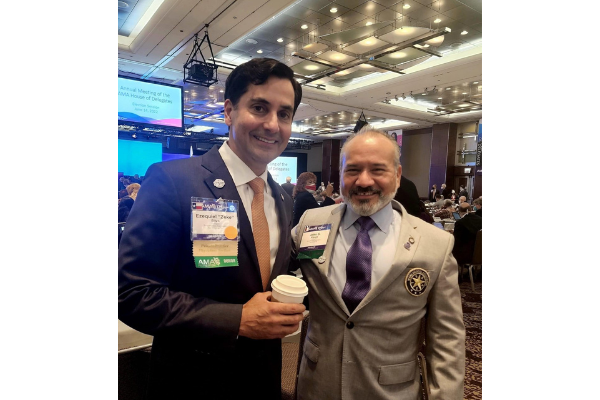
By John Flores, MD, internist, Little Elm (above, third from right)
TMA vice speaker and Texas delegate to the AMA
In mid-June, I spent eight days away from my practice and joined thousands of my physician colleagues around the nation at the 2022 American Medical Association’s House of Delegates to improve how medicine is delivered in our country.
We met in Chicago to discuss several policy initiatives to improve medicine. Our meeting included long days starting at 6 am and sometimes going late into the evening.
Personally, my duties included helping organize and run the AMA Organized Medical Staff Section's (OMSS’) annual meeting, serving on AMA's Election Committee, and chairing the AMA Reference Committee on Legislation.
The AMA OMSS is the only national organization that represents medical staff and works to protect its independence. This year, our educational program included a roundtable discussion of various modes of physician employment; five of my colleagues and I shared our experiences with the employed model during this session.
The AMA Election Committee was formed by the AMA house speakers to help them investigate any complaints involving our election rules. I have served on this committee since its inception. The importance of this committee cannot be overstated. The AMA House of Delegates spent much time over the last few years promulgating the election rules to ensure that our elections are run fairly and that those who are elected are the best candidates possible.
Finally, the committee that took much of my time was the Reference Committee on Legislation. Six of my colleagues and I spent 19 hours hearing testimony, deliberating, and producing a report, and then presenting our recommendations to the full house. We presented 42 recommendations to the house, and all but one were accepted (that one was referred).

Let me bring to your attention a few of those actions by the AMA house that stood out to me.
AMA was vigorous in its support of its board of trustees to continue to advocate for the elimination of gun violence. The board will continue to support evidence-based policies that protect U.S. citizens, which include regulation of untraceable ghost guns, raising the age to buy assault weapons from 18 to 21, and studying the effectiveness of warning labels on ammunition.
Additionally, AMA policy was changed to protect patient data collected on mobile apps at the level that other patient data are protected.
We will also support studies that analyze care delivered by nonphysician practitioners regarding patient safety and cost to the health care system.
Furthermore, we would like to see the numerous sexual assault kits collected around the country be processed with victim consent.
In addition, our Texas Delegation to the AMA worked diligently to have AMA advocate for loan forgiveness for independent private practices in need during the COVID-19 pandemic.
Finally, I would like to mention that AMA now has policy that supports the protection of physicians who speak out when unsafe conditions exist in their practice setting.
These are only a few of the policy changes that were made at the meeting, and I would direct you to the AMA website for a more comprehensive list.
It was a pleasure and an honor to represent Texas physicians at the AMA meeting. Also, it was nice to see and visit with my numerous friends and colleagues.
Last Updated On
June 22, 2022
Originally Published On
June 22, 2022